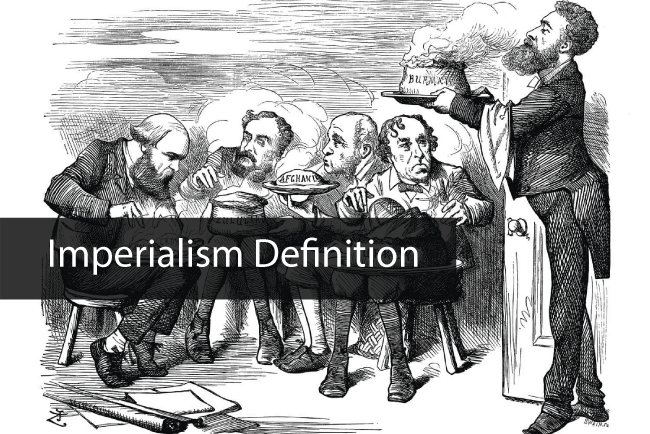Imperialism DefinitionA wealthy and powerful nation controls other nations under the imperialism system. The imperial nation tries to keep strong control over the resources of colonial nations. In other words, it can be explained as a social, economic, or political system that a country uses to control other countries or territories. The imperialists utilize the resources of the captured country for financial advantage. 
Types of Imperialism1. Economic imperialism Economic imperialism is related to commerce and money, not the government. Economic imperialism happens when a large country seizes the basic resources of a small country and makes that country financially reliant. The weaker, newer, or less powerful nation is controlled by private industry under economic imperialism. 2. Colony imperialism It is the simplest way to exert control over other countries. In this type of imperialism, a strong nation establishes its government and laws inside another nation. As a result, the nation's people lose their citizenship and have no control over laws implemented by the other nation. Foreign officials have offices in the country to monitor how their authority is working. During the 17th century, Great Britain had over 13 colonies, including Connecticut, Maryland, New York, Rhode Island, New Jersey, Massachusetts, Virginia, North Carolina, Pennsylvania, Delaware, New Hampshire, Georgia, and South Carolina. 3. Protectorate imperialism A country is considered a protectorate if it has its internal government but is yet under the control of an external force. Homeland officials are permitted to hold power and govern the nation, but they have no power to control the nation. Protectorate nations include Portugal, Gaza, Russia, Moldavia, Spain, Morocco, Turkey, Cyprus, India, and Bhutan. 4. Spheres of influence A sphere of influence was utilized by an imperial power to manage an area of an undeveloped nation. Usually, it is established through agreements and legal documents. 5. Cultural imperialism When a nation's beliefs are related to another's society and way of life, it is called cultural imperialism. Example of cultural imperialism includes forcing colonies to take education in English-language and imposing British attires. Methods Used in ImperialismThe imperialists used several strategies to establish control over other nations. 1. Conquest and annexation Modern Europeans used to send warriors to other countries to occupy the regions and found colonies. 2. Concession or franchise A concession or franchise is a term utilized to explain the sole authority that an aggressive agency obtains to exploit certain economic resources in an underdeveloped area. 3. Economic or tariff control A strong country takes complete authority over the budget or tariff system of a poor or underdeveloped area. 4. Protectorate When a strong nation indirectly uses a local puppet ruler to take political control over an underdeveloped nation is referred to as Protectorate. Pros of Imperialism1. Enhanced infrastructure and technology Strong nations develop their technologies and export them to the weaker nation they rule through imperialism. It has aided nations in developing new infrastructure, new crops, and modernized economies. 2. Healthcare is more accessible Through imperialism, advanced medical care has reached underdeveloped nations and saved countless lives by delivering vaccines and treatments. 3. Developed defensive networks The world becomes safer for the average person to explore opportunities as it becomes more borderless. Imperialist orders rule on the weak nations but offer stronger security. 4. Reduced corruption The imperial system reduced corruption because a robust central government efficiently took action on corrupt officials. Also, imperialism results in higher economic growth and progress, which aid in lowering corruption. Cons of Imperialism1. The exploitation of colonized countries The primary drawback of imperialism was the exploitation of colonized nations. There was no freedom in the colonies, and the people of the colonized nations were mistreated and used as slaves. 2. Economic exploitation Economic exploitation of the colonized nations was another drawback of imperialism. The colonizers took raw materials and resources from the colonies and sold them at a high price on the world market. Due to this financial gap between the colonizers and the colonized increased. 3. Spread of disease The COVID-19 pandemic is a prime example of the negative effects of imperialism on a country or colony. According to history, the colonizers generated deadly diseases that the colony's inhabitants had never heard of, and the colony's residents frequently died from these diseases. 4. More work, less reward People were forced to put in additional hours at lower pay. Also, the colonial masters employed many slaves to work in their homes or on their farms. 5. Forced ways of life The smaller nations are forced to adopt their cultural and religious beliefs and way of life. The imperial overlords-imposed religions and their traditions on the smaller nations. 6. Political exploitation The political exploitation of the colonized nations was another consequence of imperialism. The colony's inhabitants were forced to live according to the imperial rulers' wishes. They oppressed the populace and silenced dissenting voices. Due to this, the colonies faced political instability. FAQs on Imperialism1. Why did imperialism begin? Answer: Imperialism resulted from a desire of countries to become more powerful and prestigious in politics. Imperialism's primary goal is to seize and use the resources of countries. 2. List the nations that supported imperialism. Answer: The following nations supported the system of imperialism:
3. What elements influence imperialism? Answer: The human thirst for prestige and power, economic pressures, humanitarianism, etc., frequently influence imperialism. 4. Does industrialization produce imperialism? Answer: Industrialization occasionally results in imperialism if a country grants many rights to foreign investors.
Next TopicInteger Definition
|
 For Videos Join Our Youtube Channel: Join Now
For Videos Join Our Youtube Channel: Join Now
Feedback
- Send your Feedback to [email protected]
Help Others, Please Share










